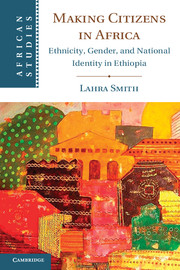Book contents
- Frontmatter
- Contents
- Maps and Tables
- Acknowledgments
- Abbreviations
- Glossary
- Maps
- Introduction
- The Challenge
- The Response
- 3 Popular Responses to Unequal Citizenship
- 4 A Referendum on Ethnic Identity and the Claims of Citizenship
- 5 No Going Back on Self-Determination for the Oromo
- 6 Ethiopian Women and Citizenship Rights Deferred
- Conclusion
- Appendix I Methodology
- Appendix II Questionnaire for Parents and Community Members (English)
- Appendix III Questionnaire for School Directors
- Appendix IV Questionnaire for Teachers
- Bibliography
- Index
4 - A Referendum on Ethnic Identity and the Claims of Citizenship
Published online by Cambridge University Press: 05 May 2013
- Frontmatter
- Contents
- Maps and Tables
- Acknowledgments
- Abbreviations
- Glossary
- Maps
- Introduction
- The Challenge
- The Response
- 3 Popular Responses to Unequal Citizenship
- 4 A Referendum on Ethnic Identity and the Claims of Citizenship
- 5 No Going Back on Self-Determination for the Oromo
- 6 Ethiopian Women and Citizenship Rights Deferred
- Conclusion
- Appendix I Methodology
- Appendix II Questionnaire for Parents and Community Members (English)
- Appendix III Questionnaire for School Directors
- Appendix IV Questionnaire for Teachers
- Bibliography
- Index
Summary
The Anywaa woman of the Shola market is not the only citizen of Ethiopia imperfectly and incompletely incorporated into modern Ethiopian citizenship regimes. Other individuals and groups, some numerically small, and some rather large in size, have contested the terms of their inclusion in recent decades, testing not only the present regime’s federal system, but a century and a half of a narrative of expanding citizenship. One prominent case came to fruition in early 2001, when voters in a poor region of southern Ethiopia were presented with a unique referendum on ethnicity. The Siltie, previously considered a subclan of the Gurage ethnic group, were asked quite simply, “Are the Siltie Gurage or not?” Their answer was overwhelmingly that the Siltie were not Gurage. This unique exercise in voting for an ethnic identity is one of the most dramatic modern experiments in injecting direct political competition into what has traditionally been regarded as a social or cultural matter. It followed years of campaigning, both for and against Siltie separation, by members of both the ruling political party and opposition parties, and prompted debate and eventually arbitration at the highest political authority on questions of nationality in Ethiopia: the House of Federation, which had ordered the referendum.
The complex and contested meanings underlying Siltie and Gurage identities provide a critical window into the citizen-creation and citizenship-expansion processes in Ethiopia and the potential of public policy with respect to ethnic identities in the context of conflict. Vesting a decision regarding the boundaries and content of ethnicity in the hands of ordinary citizens is a somewhat unusual political maneuver. Some would call it inherently democratic, as democratic procedures were followed and the results were accepted by all major parties. This is the argument, for instance, of Laitin and Reich’s “liberal democratic approach” to language policy.
- Type
- Chapter
- Information
- Making Citizens in AfricaEthnicity, Gender, and National Identity in Ethiopia, pp. 120 - 138Publisher: Cambridge University PressPrint publication year: 2013

